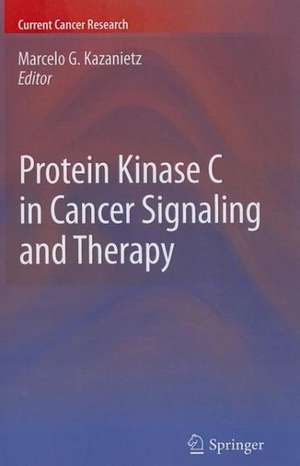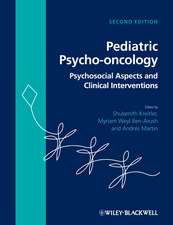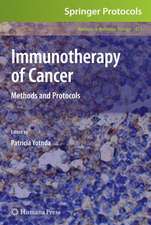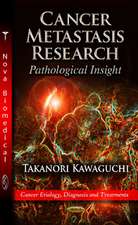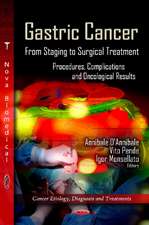Protein Kinase C in Cancer Signaling and Therapy: Current Cancer Research
Editat de Marcelo G. Kazanietzen Limba Engleză Paperback – 7 sep 2012
This book will have 4 sections. There will be 23 chapters. Each section will have a brief introduction by an expert in the field (~ 1-2 pages).
| Toate formatele și edițiile | Preț | Express |
|---|---|---|
| Paperback (1) | 1421.21 lei 6-8 săpt. | |
| Humana Press Inc. – 7 sep 2012 | 1421.21 lei 6-8 săpt. | |
| Hardback (1) | 1426.71 lei 6-8 săpt. | |
| Humana Press Inc. – 17 iun 2010 | 1426.71 lei 6-8 săpt. |
Din seria Current Cancer Research
- 5%
 Preț: 1132.09 lei
Preț: 1132.09 lei - 5%
 Preț: 1609.56 lei
Preț: 1609.56 lei - 5%
 Preț: 728.68 lei
Preț: 728.68 lei - 5%
 Preț: 1094.08 lei
Preț: 1094.08 lei - 5%
 Preț: 1089.85 lei
Preț: 1089.85 lei - 5%
 Preț: 1481.57 lei
Preț: 1481.57 lei - 5%
 Preț: 1094.80 lei
Preț: 1094.80 lei - 5%
 Preț: 1447.73 lei
Preț: 1447.73 lei - 5%
 Preț: 706.97 lei
Preț: 706.97 lei - 5%
 Preț: 1096.81 lei
Preț: 1096.81 lei - 5%
 Preț: 1098.48 lei
Preț: 1098.48 lei - 5%
 Preț: 1112.17 lei
Preț: 1112.17 lei - 5%
 Preț: 714.63 lei
Preț: 714.63 lei - 5%
 Preț: 1297.22 lei
Preț: 1297.22 lei - 5%
 Preț: 1100.64 lei
Preț: 1100.64 lei - 5%
 Preț: 1103.95 lei
Preț: 1103.95 lei - 5%
 Preț: 715.35 lei
Preț: 715.35 lei - 5%
 Preț: 1171.03 lei
Preț: 1171.03 lei - 5%
 Preț: 902.44 lei
Preț: 902.44 lei - 5%
 Preț: 1608.47 lei
Preț: 1608.47 lei - 5%
 Preț: 1438.78 lei
Preț: 1438.78 lei
Preț: 1421.21 lei
Preț vechi: 1496.01 lei
-5% Nou
Puncte Express: 2132
Preț estimativ în valută:
271.96€ • 290.81$ • 226.75£
271.96€ • 290.81$ • 226.75£
Carte tipărită la comandă
Livrare economică 17 aprilie-01 mai
Preluare comenzi: 021 569.72.76
Specificații
ISBN-13: 9781617796913
ISBN-10: 1617796913
Pagini: 508
Ilustrații: XIV, 494 p. 37 illus., 11 illus. in color.
Dimensiuni: 155 x 235 x 27 mm
Greutate: 0.7 kg
Ediția:2010
Editura: Humana Press Inc.
Colecția Humana
Seria Current Cancer Research
Locul publicării:Totowa, NJ, United States
ISBN-10: 1617796913
Pagini: 508
Ilustrații: XIV, 494 p. 37 illus., 11 illus. in color.
Dimensiuni: 155 x 235 x 27 mm
Greutate: 0.7 kg
Ediția:2010
Editura: Humana Press Inc.
Colecția Humana
Seria Current Cancer Research
Locul publicării:Totowa, NJ, United States
Public țintă
ResearchCuprins
Regulation of PKC Isozyme Function: From Genes to Biochemistry.- Protein Kinase C in Cancer Signaling and Therapy: Introduction and Historical Perspective.- Regulation of Conventional and Novel Protein Kinase C Isozymes by Phosphorylation and Lipids.- Phorbol Esters and Diacylglycerol: The PKC Activators.- Diacylglycerol Signaling: The C1 Domain, Generation of DAG, and Termination of Signals.- Regulation of PKC by Protein–Protein Interactions in Cancer.- PKC Isozymes in the Control of Cell Function.- Introduction: PKC Isozymes in the Control of Cell Function.- Regulation and Function of Protein Kinase D Signaling.- PKC and Control of the Cell Cycle.- PKC and the Control of Apoptosis.- Atypical PKCs, NF-?B, and Inflammation.- PKC Isozymes in Cancer.- Introduction: PKC and Cancer.- Protein Kinase C, p53, and DNA Damage.- PKCs as Mediators of the Hedgehog and Wnt Signaling Pathways.- PKC–PKD Interplay in Cancer.- Transgenic Mouse Models to Investigate Functional Specificity of Protein Kinase C Isoforms in the Development of Squamous Cell Carcinoma, a Nonmelanoma Human Skin Cancer.- PKC Isozymes and Skin Cancer.- PKC and Breast Cancer.- PKC and Prostate Cancer.- Protein Kinase C and Lung Cancer.- PKC Isozymes as Targets for Cancer Therapy.- PKC and Resistance to Chemotherapeutic Agents.- PKC? as a Target for Chemotherapeutic Drugs.- Atypical PKCs as Targets for Cancer Therapy.
Textul de pe ultima copertă
Protein kinase C (PKC), a family of serine-threonine kinases, rocketed to the forefront of the cancer research field in the early 1980’s with its identification as an effector of phorbol esters, natural products with tumor-promoting activity. Phorbol esters had long been of interest to the cancer research field due to early studies in the mouse skin carcinogenesis model, which showed that prolonged topical application of phorbol esters promoted the formation of skin tumors on mice previously treated with mutagenic agents.
Research in the last years has established key roles for PKC isozymes in the control of cell proliferation, migration, adhesion, and malignant transformation. In addition, there is a large body of evidence linking PKC to invasion and cancer cell metastasis. It is now well established that the expression of PKC isozymes is altered in various types of cancers. More importantly, small molecule inhibitors have been developed with significant anti-cancer activity. The relevance of PKC isozymes in cancer signaling is therefore remarkable.
Protein Kinase C in Cancer Signaling and Therapy is composed of twenty-three chapters written by leading experts in the field. The book is divided into four sections: Regulation of PKC isozyme function: from genes to biochemistry, PKC isozymes in the control of cell function, PKC isozymes in cancer, and PKC isozymes as targets for cancer therapy. Each section of Protein Kinase C in Cancer Signaling and Therapy begins with an introduction by an established professional in the field of Protein kinase C, followed by chapters that elucidate the importance of PKC in current cancer research.
Research in the last years has established key roles for PKC isozymes in the control of cell proliferation, migration, adhesion, and malignant transformation. In addition, there is a large body of evidence linking PKC to invasion and cancer cell metastasis. It is now well established that the expression of PKC isozymes is altered in various types of cancers. More importantly, small molecule inhibitors have been developed with significant anti-cancer activity. The relevance of PKC isozymes in cancer signaling is therefore remarkable.
Protein Kinase C in Cancer Signaling and Therapy is composed of twenty-three chapters written by leading experts in the field. The book is divided into four sections: Regulation of PKC isozyme function: from genes to biochemistry, PKC isozymes in the control of cell function, PKC isozymes in cancer, and PKC isozymes as targets for cancer therapy. Each section of Protein Kinase C in Cancer Signaling and Therapy begins with an introduction by an established professional in the field of Protein kinase C, followed by chapters that elucidate the importance of PKC in current cancer research.
Caracteristici
Focuses specifically on PKC signaling at a mechanistic level in the context of cancer The first to present in a very detailed manner the implication of PKC isozymes in different types of cancers There will be a full section on anticancer agents that target PKC and on how PKC modulates the sensitivity of cancer cells to chemotherapeutic drugs Includes supplementary material: sn.pub/extras
